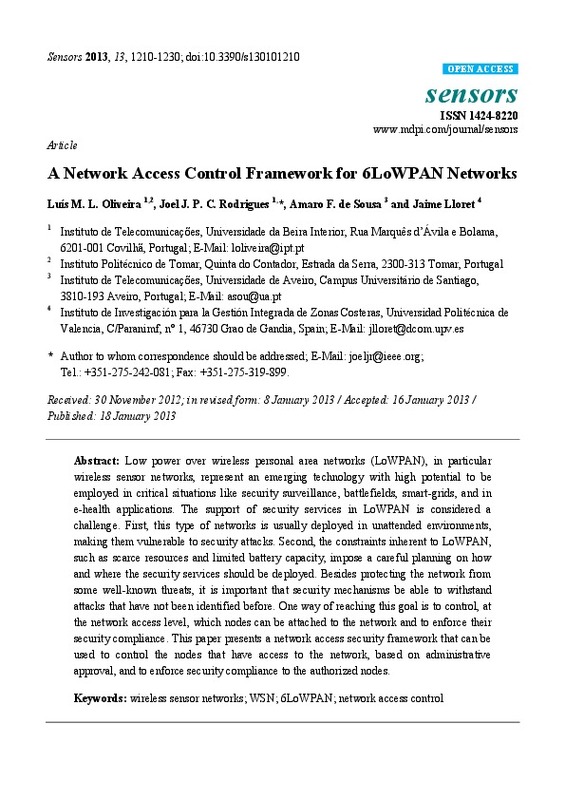http://www.ietf.org/rfc/rfc4919.txt
Oliveira, L. M. L., de Sousa, A. F., & Rodrigues, J. J. P. C. (2011). Routing and mobility approaches in IPv6 over LoWPAN mesh networks. International Journal of Communication Systems, 24(11), 1445-1466. doi:10.1002/dac.1228
Gershenfeld, N., Krikorian, R., & Cohen, D. (2004). The Internet of Things. Scientific American, 291(4), 76-81. doi:10.1038/scientificamerican1004-76
[+]
http://www.ietf.org/rfc/rfc4919.txt
Oliveira, L. M. L., de Sousa, A. F., & Rodrigues, J. J. P. C. (2011). Routing and mobility approaches in IPv6 over LoWPAN mesh networks. International Journal of Communication Systems, 24(11), 1445-1466. doi:10.1002/dac.1228
Gershenfeld, N., Krikorian, R., & Cohen, D. (2004). The Internet of Things. Scientific American, 291(4), 76-81. doi:10.1038/scientificamerican1004-76
Hui, J. W., & Culler, D. E. (2008). Extending IP to Low-Power, Wireless Personal Area Networks. IEEE Internet Computing, 12(4), 37-45. doi:10.1109/mic.2008.79
http://www.ietf.org/rfc/rfc4861.txt
Wang, Y., Attebury, G., & Ramamurthy, B. (2006). A survey of security issues in wireless sensor networks. IEEE Communications Surveys & Tutorials, 8(2), 2-23. doi:10.1109/comst.2006.315852
Oliveira, L. M. L., Rodrigues, J. J. P. C., de Sousa, A. F., & Lloret, J. (2012). Denial of service mitigation approach for IPv6-enabled smart object networks. Concurrency and Computation: Practice and Experience, 25(1), 129-142. doi:10.1002/cpe.2850
Xiaojiang Du, & Hsiao-Hwa Chen. (2008). Security in wireless sensor networks. IEEE Wireless Communications, 15(4), 60-66. doi:10.1109/mwc.2008.4599222
Pelechrinis, K., Iliofotou, M., & Krishnamurthy, S. V. (2011). Denial of Service Attacks in Wireless Networks: The Case of Jammers. IEEE Communications Surveys & Tutorials, 13(2), 245-257. doi:10.1109/surv.2011.041110.00022
Lopez, J., Roman, R., & Alcaraz, C. (2009). Analysis of Security Threats, Requirements, Technologies and Standards in Wireless Sensor Networks. Lecture Notes in Computer Science, 289-338. doi:10.1007/978-3-642-03829-7_10
Elaine Shi, & Perrig, A. (2004). Designing Secure Sensor Networks. IEEE Wireless Communications, 11(6), 38-43. doi:10.1109/mwc.2004.1368895
Roman, R., Lopez, J., & Gritzalis, S. (2008). Situation awareness mechanisms for wireless sensor networks. IEEE Communications Magazine, 46(4), 102-107. doi:10.1109/mcom.2008.4481348
Sakarindr, P., & Ansari, N. (2007). Security services in group communications over wireless infrastructure, mobile ad hoc, and wireless sensor networks. IEEE Wireless Communications, 14(5), 8-20. doi:10.1109/mwc.2007.4396938
Khan, M. K., & Alghathbar, K. (2010). Cryptanalysis and Security Improvements of ‘Two-Factor User Authentication in Wireless Sensor Networks’. Sensors, 10(3), 2450-2459. doi:10.3390/s100302450
Xiao, Y., Rayi, V. K., Sun, B., Du, X., Hu, F., & Galloway, M. (2007). A survey of key management schemes in wireless sensor networks. Computer Communications, 30(11-12), 2314-2341. doi:10.1016/j.comcom.2007.04.009
Kun Sun, Peng Ning, & Wang, C. (2005). Fault-Tolerant Cluster-Wise Clock Synchronization for Wireless Sensor Networks. IEEE Transactions on Dependable and Secure Computing, 2(3), 177-189. doi:10.1109/tdsc.2005.36
Perrig, A., Szewczyk, R., Tygar, J. D., Wen, V., & Culler, D. E. (2002). Wireless Networks, 8(5), 521-534. doi:10.1023/a:1016598314198
Araz, O., & Qi, H. (2006). Load-balanced key establishment methodologies in wireless sensor networks. International Journal of Security and Networks, 1(3/4), 158. doi:10.1504/ijsn.2006.011775
http://www.ietf.org/rfc/rfc4944.txt
http://www.ietf.org/rfc/rfc6550.txt
http://www.ietf.org/rfc/rfc4862.txt
http://www.ietf.org/rfc/rfc4291.txt
http://www.ietf.org/rfc/rfc3971.txt
http://www.ietf.org/rfc/rfc5548.txt
http://www.ietf.org/rfc/rfc5673.txt
http://www.ietf.org/rfc/rfc5826.txt
http://www.ietf.org/rfc/rfc5867.txt
Jeonggil Ko, Terzis, A., Dawson-Haggerty, S., Culler, D. E., Hui, J. W., & Levis, P. (2011). Connecting low-power and lossy networks to the internet. IEEE Communications Magazine, 49(4), 96-101. doi:10.1109/mcom.2011.5741163
Mottola, L., & Picco, G. P. (2011). Programming wireless sensor networks. ACM Computing Surveys, 43(3), 1-51. doi:10.1145/1922649.1922656
Intanagonwiwat, C., Govindan, R., Estrin, D., Heidemann, J., & Silva, F. (2003). Directed diffusion for wireless sensor networking. IEEE/ACM Transactions on Networking, 11(1), 2-16. doi:10.1109/tnet.2002.808417
Deluge T2-TinyOS Documentation Wikihttp://docs.tinyos.net/tinywiki/index.php/Deluge_T2
[-]









